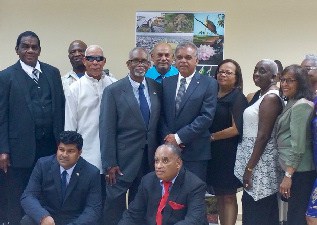U.S. supports extending U.N. stabilization mission in Haiti
Washington – The United States supports extending a U.N. stabilization mission in Haiti to February 2008, as called for in a new U.N. report, says Brian Nichols, director of the State Department’s Office of Caribbean Affairs.
In a January 10 statement to USINFO, Nichols said the U.N. mission, known by the acronym MINUSTAH, has “played a vital role in the international community’s efforts to help Haiti.” The United States looks forward “to the U.N. Security Council renewing its mandate” for MINUSTAH in the coming weeks, he said.
Nichols added MINUSTAH is “working to facilitate a secure environment for good governance and economic development that is essential for Haiti’s lasting stability and prosperity.”
The report by former U.N. Secretary-General Kofi Annan says Haiti will continue to face “significant challenges” in 2007. Annan recommends in the report that the U.S.-backed MINUSTAH should continue with its current authorized troop and police ceilings. MINUSTAH’s mandate will end on February 15, 2007, unless it is extended. The report by Annan, who was succeeded by Ban Ki-moon of South Korea January 1, covers MINUSTAH’s work from July 2006 until December 2006.
Nichols said the United States “remains committed to helping the Haitian people build a stable, democratic, and prosperous nation.” As the world’s largest single country donor to Haiti and also the Caribbean nation’s biggest trade partner, the United States has provided more than $600 million in assistance to Haiti from 2004 to 2006, said Nichols.
MINUSTAH currently employs more than 6,600 military personnel and more than 1,700 police officers, as well as hundreds of civilian staff assisting the people of Haiti, the poorest nation in the Western Hemisphere. MINUSTAH is working to promote a secure and stable environment in Haiti, support the country’s political process and monitor and uphold human rights.
The United States maintains a small military staff contingent in Haiti as part of MINUSTAH, which was created by a U.N. Security Council resolution on April 30, 2004. The resolution stated the mission would remain in Haiti for an initial six-month period. In November 2004, the Security Council renewed the mission for another six months, until June 1, 2005, with the announced intent to renew for additional periods, as needed.
Another official in the State Department’s Office of Caribbean Affairs told USINFO January 9 the United States has been “on record” in favor of further extending MINUSTAH’s mandate, when it voted in the Security Council in August 2006 for a six-month extension for MINUSTAH to February 2007.
In his call for extending MINUSTAH, Annan cited the potential for “destabilizing forces” to use violence to “attain their objectives” and argued that “the continued engagement” of the U.N. mission’s military and police “will remain crucial in responding to significant threats at a time when Haiti’s own security capacity is still at an early stage of development.”
The challenges ahead for Haiti’s government, Annan said, cover the areas of “security, institution-building and socio-economic development.” He added that although primary responsibility for ensuring progress remains with Haiti’s leadership and people, international aid to Haiti remains essential.
The United States has participated in recent years in international conferences of donors for Haiti designed to support democracy and restore stability in the Caribbean country.
One such event took place in November 2006 in Madrid, Spain, and discussed technical and coordination issues related to the financial aid being provided by the United States and other donor nations and multilateral groups. The conference focused on the “stocktaking” of progress being made to bring stability and security to Haiti.
At another donors’ conference for Haiti, held in the capital of Port-au-Prince July 25, 2006, the United States pledged $210 million for July 2006 to September 2007 to help in Haiti’s economic recovery.
The U.S. Agency for International Development (USAID), in announcing in October 2006 it had signed a three-year agreement with Haiti to support the nation’s progress toward stability and growth, said the United States “is committed to work with Haitian citizens and their government over the long term to address the country’s many challenges and provide hope and opportunity to all Haitians.”
Ban Ki-moon, the new U.N. secretary-general, announced January 9 he was naming Major General Carlos Alberto Dos Santos Cruz of Brazil as MINUSTAH’s new force commander. He succeeds Lieutenant General José Elito Carvalho Siqueira, also of Brazil, who was appointed to the post in January 2006.



